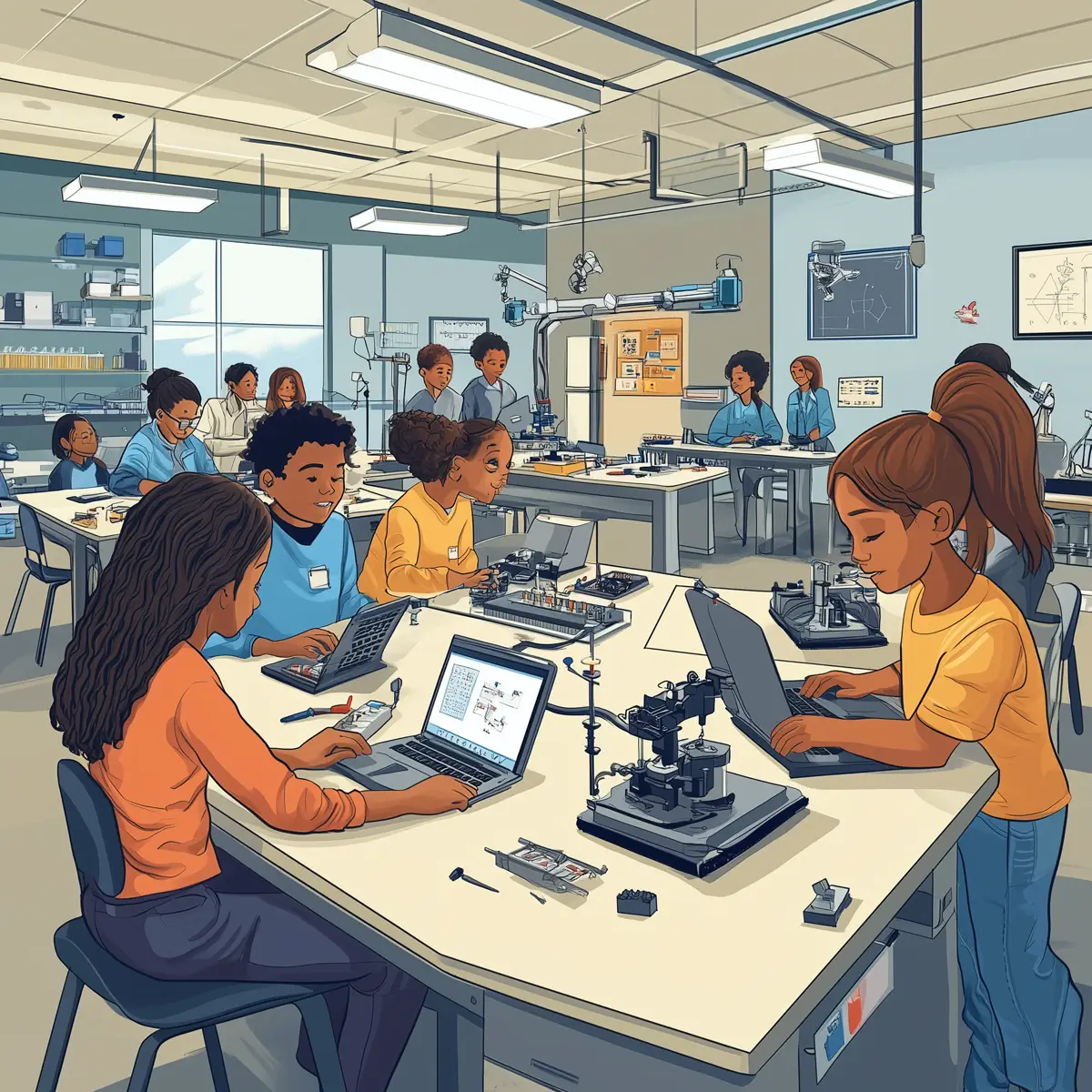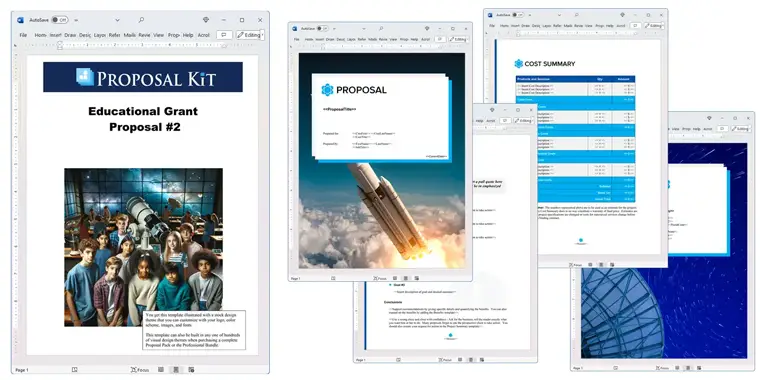How to write your Educational Grant Proposal #2
We include this 18 page layout with every Proposal Pack. If you want this template to have a different visual design theme than the one illustrated here, purchase any Proposal Pack design and create this template using the purchased design theme. This template is included in every Proposal Pack. If you get a Proposal Pack or the Professional, you can also make any variation of this template with different chapters to suit your needs.
We typically include more chapters in the templates than most people will need to give everyone more variety in the chapters they may need. You can trim down a long template by removing pages you do not need or combining multiple chapter topics into one page.
 DOWNLOADABLE, ONE-TIME COST, NO SUBSCRIPTION FEES
DOWNLOADABLE, ONE-TIME COST, NO SUBSCRIPTION FEES![]() View Educational Grant Sample Proposal #2
View Educational Grant Sample Proposal #2
This sample proposal is based on the same layout as this template and is included in every Proposal Pack. The visual design of the templates will match whichever Proposal Pack design you purchase. To get this template in a different design theme than shown in the sample, purchase any other Proposal Pack design theme and this template will be included.
You can create an editable Word version of this sample in any design theme of your choice including branded to your logo.
You can also create countless variations of this document to suit your needs using the included library of 2200+ chapters if ordering a Proposal Pack or Professional.
 What Our Clients Say
What Our Clients SayUseful for new proposal writers. Takes away the pain of having to repeatedly re-enter the same basic information into proposals. Valuable for someone new to proposal writing. Great how it automatically builds the proposal based on recommended sections to include or ones you choose. Takes a while to work out how it works but once you’ve done one it’s fine. Changing design and layout can be a challenge once the proposal is generated but this is really a Word problem. Really useful for someone wanting to take the leap into proposal writing."
Related Article
Related Video
Related Templates
- Educational Grant Proposal
- Daycare Preschool Grant Funding Proposal
- DOE Federal Government Grant Proposal
- STEM Educational Program Proposal
- Vocational Education Proposal
- New College Curriculum Proposal
- Charter School Educational Proposal
- Specialized Training Educational Proposal
- Tutoring Educational Services Proposal
- School Improvement Project Proposal
- Computer Lab for Students Educational Proposal
- DOE Federal Government Grant Proposal #2
- Educational Training for Special Needs Proposal
- Science Lab for Students Educational Proposal
- Mobile Literacy Program Funding Proposal
- School Funding Request Proposal
- DOE Federal Government Grant Proposal 2
- Music School Educational Proposal
- Ranching Educational Grant Funding Proposal
- Art Therapy Grant Proposal
- Grant Funding Request Proposal
- Grant Proposal for Special Needs Support
- Online School and Media Outlet Funding Proposal
What's the best way to write your educational grant proposal?
When tasked with creating an educational grant proposal, especially for those unfamiliar with the intricacies of proposal writing, the best way forward is through the Proposal Kit template and software package.
Proposal Kit simplifies the creation process, providing a comprehensive template library and a Wizard software program that incorporates crucial financial tools like a line item quoting database for costs, quotes, estimates, budgets, and more. This integration ensures that all financial aspects of your proposal are accurate and detailed, making your submission both professional and competitive.
Many grants are responses to RFPs from foundations and government agencies that must adhere to RFP guidelines. Because of this, most grant proposals need to be custom-made to fit the guidelines of the RFP. That means there are no one-size-fits-all templates. This is an example of one specific government grant RFP response. Using the Proposal Kit, you can create custom proposal responses like this one to fit your particular RFP.
Are you preparing to write a grant proposal for an educational program similar to these? If so, the Proposal Kit can guide you through the process.
What Types of Projects Are Educational Grant RFP Responses Written For?
Educational grants can fund a wide array of projects. Here are ten examples of what these might include:
- Science Field Trips: Funding for visits to science centers or natural habitats, enhancing learning through hands-on experience.
- Technology Integration: Acquisition of new technology to facilitate interactive learning environments.
- Literacy Programs: Initiatives to improve reading skills and comprehension among students.
- STEM Workshops: Programs to boost interest and skills in science, technology, engineering, and mathematics.
- Cultural Exchange Programs: Opportunities for students to experience and learn from other cultures.
- Environmental Education: Projects that teach students about environmental conservation and sustainability.
- Art and Music Enrichment: Funding for supplies and instruction in the arts, which are often underfunded in public schools.
- Health and Wellness: Programs promoting physical activity and healthy living habits among students.
- Special Education Resources: Tools and programs tailored to enhance learning for students with special needs.
- Teacher Training: Workshops and seminars provide teachers with new skills and teaching methods to better serve their students.
Chapters this template is built with
These, written using Proposal Kit's templates, provide a robust framework for developing a comprehensive, professional, and persuasive educational grant proposal.
These chapter templates are just a small selection from the thousands available in the Proposal Kit template library. You can customize your proposal to cover all necessary topics, ensuring it addresses every aspect of your project comprehensively.
Cover Sheet
The Cover Sheet is the reviewer's initial impression of your proposal. It should convey the purpose and professionalism of your document immediately. The Proposal Kit's Cover Sheet template ensures that this crucial page is visually appealing and organized to present important information like the project title, the organization's name, your contact details, and the submission date. This template helps set a tone of authority and credibility right from the start.
Executive Summary
The Executive Summary is an overview of your proposal, briefly highlighting the rationale behind the need for funding and the unique benefits your project offers. This section condenses your proposal's key points, emphasizing the positive changes your project aims to bring about and why it deserves support. Using the Executive Summary template from the Proposal Kit, you can ensure that your project's merits are clearly and compellingly presented, catching the interest of funders from the outset.
Project Methods
In the Project Methods section, you describe your specific actions to achieve your project's goals. This template guides you to detail each step of your project's implementation, from initiation to completion. It helps you outline the methodologies, tools, and processes that will be employed, ensuring that funders can easily understand and evaluate the feasibility and thoughtfulness of your project plan.
Project Background
The Project Background provides the historical and contextual framework for understanding the current proposal. It explains how previous research, initiatives, or observed gaps inform your project. This template helps you articulate the evolution of the idea, demonstrating continuity and innovation in addressing the identified needs, thereby establishing a solid foundation for your project's necessity.
Time Line
Using the Time Line template, you can outline the projected schedule for your project. This includes key phases, milestones, and deadlines. A clear timeline shows the project's organization and thorough planning and reassures funders that the project team can manage and execute the project within the proposed time frame.
Curriculum
If your grant seeks to develop educational content, the Curriculum template is essential. It allows you to specify what will be taught, how it will be delivered, and what educational outcomes are expected. This section demonstrates the substantive content of your project, showcasing the thought and expertise that has gone into educational planning and design.
Evaluation
The Evaluation template describes how the project's success will be measured. This includes detailing the criteria, methodologies, and tools that will be used to assess the project outcomes. A well-defined evaluation plan is crucial for proving the project's impact and effectiveness, thus assuring funders of the project's value and sustainability.
Sources of Funds
This template details all potential and secured funding sources and helps illustrate the diversified financial support your project has or seeks. By showcasing a broad support base, you strengthen your project's credibility and may encourage hesitant funders by demonstrating shared financial commitment.
Uses of Funds
Transparency in financial matters is critical to winning trust. The Uses of Funds template allows you to itemize how each grant portion will be spent. This section breaks down costs associated with different project activities, providing a clear, accountable budget plan that reassures funders their contributions will be used appropriately.
Funding Request
The Funding Request template is where you make a clear and compelling case for the specific amount of funding you need. This section should be direct and persuasive, detailing the funds' necessity and the funding's consequences on the project's success.
Budget
The Budget template provides a comprehensive financial breakdown of your project. This should include all direct and indirect costs associated with the project. A detailed, justified budget is essential for demonstrating fiscal responsibility and planning.
Project Summary
This template allows for a brief recapitulation of the proposal, emphasizing its most vital points and overall importance. The Project Summary reinforces the narrative built throughout the proposal, ensuring the key messages resonate with the funders.
Education
The education template discusses the underlying educational theories and pedagogical strategies. It ensures that your project aligns with best practices and contemporary educational research. This section lends academic credibility and depth to your proposal.
Programs and Activities
Detail the specific educational programs and activities planned, using this template to clearly outline how each contributes to achieving the project's academic goals. This helps funders visualize the project's practical implementation.
Faculty
Finally, the Faculty template showcases the team behind the project. Detailing their qualifications, experience, and roles guarantees their capability to deliver the project successfully. This section helps establish trust in the project's human resource foundation.
Use cases for this template
Ellen and StarGazers Academy
Ellen, the program coordinator at StarGazers Academy, faced the challenge of securing funding for an educational experience: a space simulator camp. This camp was designed to inspire and educate students about astronomy and space technology.
Ellen used the Proposal Kit to create her grant proposal, emphasizing the unique educational benefits of the space simulator experience. The templates helped her present a narrative that detailed how the camp would use state-of-the-art simulators to enhance STEM learning.
Her well-structured proposal, with clear objectives and anticipated learning outcomes, successfully attracted the funding needed, allowing students to engage in a hands-on, immersive learning environment that brought the wonders of the universe closer to home.
Marcus and Historic Horizons Educational Programs
Marcus, an educator at Historic Horizons Educational Programs, sought to enrich his curriculum by integrating more real-world learning experiences. He aimed to take his students to a renowned history museum to bring the concepts discussed in class to life.
To achieve this, Marcus turned to Proposal Kit to develop a grant proposal outlining the museum's educational objectives and interactive learning opportunities. He used the templates to highlight how the museum visit would allow students to explore historical artifacts and exhibits, thereby deepening their understanding of cultural and historical contexts.
His well-articulated proposal, backed by clear educational goals and a detailed itinerary, secured the necessary funding, enabling students to experience history beyond the classroom walls.
Julia and GeoExplorers Educational Initiative
Julia, the director of GeoExplorers Educational Initiative, recognized the educational potential of hands-on geology field trips. She envisioned a program that would take students to various geological sites to study earth sciences in a real-world context.
To bring this vision to fruition, Julia used the Proposal Kit to create a detailed grant proposal. Her proposal outlined the educational benefits of hands-on learning experiences, such as rock and mineral analysis, erosion studies, and sedimentary layer observations.
The Proposal Kit templates allowed her to articulate the field trip objectives, educational methods, and expected outcomes clearly. Her detailed and persuasive proposal secured the funding needed, providing students with invaluable opportunities to engage directly with the natural world and enhancing their academic and practical understanding of geology.
Conclusions and Recommendations
The Proposal Kit is an indispensable tool for anyone looking to create an educational grant proposal. It guides you through the setup of detailed financial plans with its line item quoting database and provides templates for every section of your proposal. By aligning with funders' needs and presenting your project's potential, the Proposal Kit helps ensure your educational initiatives get the support you need.
Also Known As
This template may also be referred to in different ways or be used in more specialized situations, such as:
- Educational Funding Request Document 2
- Second Academic Grant Submission
- Educational Project Funding Proposal II
- Higher Education Grant Application, Phase 2
- Educational Financial Support Proposal Version 2
- Learning Enhancement Funding Proposal #2
- Academic Improvement Grant Proposal: 2nd Edition
- Proposal for Educational Grant: Sequence 2
- Educational Initiative Funding Appeal 2
- Second Proposal for Academic Grant Assistance
Abstract
 Creating a successful educational grant proposal involves navigating a structured and detailed writing process. The Proposal Kit offers a step-by-step guide to assist applicants in creating proposals that align with grant-making entities' specific requirements. By using tools like Proposal Kit's line item quoting database, you ensure that your proposal budget is both accurate and competitive.
Creating a successful educational grant proposal involves navigating a structured and detailed writing process. The Proposal Kit offers a step-by-step guide to assist applicants in creating proposals that align with grant-making entities' specific requirements. By using tools like Proposal Kit's line item quoting database, you ensure that your proposal budget is both accurate and competitive.
This software aids in developing a winning grant proposal by integrating all necessary topics, such as a project timeline, budget justification, and a proposal summary that clearly outlines your project's goals and measurable outcomes. Understanding the grant writing process is crucial, whether you're seeking federal funding or additional funding from private sources.
Educational grants can fund various projects, from technology integration and STEM workshops to special education resources and teacher training. These grants provide valuable grant opportunities to nonprofit organizations, school administrators, and educators committed to enhancing learning experiences. The Proposal Kit templates offer guidance in presenting a clear project description, research methods, and evaluation strategies that demonstrate the project's impact and sustainability. By addressing the specific structure demanded by grant reviewers and ensuring all supporting documents are complete, you increase your chances of writing a successful grant application.
 To convey the need for funding, applicants must begin with a strong problem statement supported by relevant literature and research findings. Highlighting the desired outcomes and aligning them with the organization's mission can capture potential funders' interest. The inclusion of a detailed project budget and budget narrative further clarifies how grant funds will achieve the project's objectives.
To convey the need for funding, applicants must begin with a strong problem statement supported by relevant literature and research findings. Highlighting the desired outcomes and aligning them with the organization's mission can capture potential funders' interest. The inclusion of a detailed project budget and budget narrative further clarifies how grant funds will achieve the project's objectives.
By maintaining a professional writing tone and following application guidelines, applicants can create compelling grant letters that resonate with grant-making bodies. Ultimately, the Proposal Kit simplifies the writing process, making it an invaluable resource for navigating the complexities of grant writing in various academic disciplines.
Educational grant writing is an intricate process that requires a thorough understanding of proposal writing and the grant making landscape. The Proposal Kit provides aspiring applicants with a comprehensive toolset to streamline this process, ensuring that grant proposals meet the expectations of grant making entities. By employing a line item quoting database, applicants can develop a proposal budget that reflects accurate project costs, thereby enhancing the proposal's credibility. This approach is especially beneficial for federal funding applications, where budget justification is an important component.
 In developing a proposed project, it is important to articulate a clear project description and timeline. This involves detailing the project's scope, objectives, and desired outcomes, which should be both specific and measurable. Applicants must demonstrate their project's potential impact through an evidence-based needs assessment using research methods that align with the institution's mission and priorities. By presenting a well-researched problem statement and a robust research design, applicants can communicate the significance of their project to grant reviewers.
In developing a proposed project, it is important to articulate a clear project description and timeline. This involves detailing the project's scope, objectives, and desired outcomes, which should be both specific and measurable. Applicants must demonstrate their project's potential impact through an evidence-based needs assessment using research methods that align with the institution's mission and priorities. By presenting a well-researched problem statement and a robust research design, applicants can communicate the significance of their project to grant reviewers.
Nonprofit organizations, graduate students, and researchers from various academic disciplines can benefit from the Proposal Kit's templates, which cover important sections such as the cover letter, executive summary, and evaluation plan. The templates also assist in organizing all the materials and supporting documents needed for a complete grant application. By addressing the specific requirements of each grant opportunity, applicants can better align their proposals with the expectations of potential funders.
The Proposal Kit also emphasizes the importance of a budget narrative, which provides a detailed explanation of project costs and how they contribute to achieving the project's goals. This narrative should include an assessment of other resources, such as additional funding, partnerships, or in-kind contributions, that will support the project's implementation. A clear and well-structured budget plan can reassure funders of the project's fiscal responsibility and sustainability.
 For those new to grant writing, the learning process may involve experimenting with different writing styles and seeking feedback from colleagues or mentors. It is crucial to double-check all documentation and revise drafts to ensure clarity and coherence. Applicants should not hesitate to inquire about specific application guidelines or rules that govern the grant program. Understanding these factors is vital for creating a proposal that stands out and meets the expectations of grant reviewers.
For those new to grant writing, the learning process may involve experimenting with different writing styles and seeking feedback from colleagues or mentors. It is crucial to double-check all documentation and revise drafts to ensure clarity and coherence. Applicants should not hesitate to inquire about specific application guidelines or rules that govern the grant program. Understanding these factors is vital for creating a proposal that stands out and meets the expectations of grant reviewers.
In conclusion, the Proposal Kit is an indispensable resource for anyone seeking funding through educational grants. By guiding users through the writing process and offering templates for every proposal section, it supports the creation of compelling, well-organized proposals. Whether you are a principal investigator, a nonprofit organization, or a university department, the Proposal Kit equips you with the tools to navigate the complexities of grant writing and increase your chances of being awarded funding for your educational initiatives.
Frequently Asked Questions
What should be included in an educational grant proposal?
An educational grant proposal typically includes several key components: the abstract or summary, which provides a brief overview of the project; the needs statement, which outlines the problem or gaps the project aims to address; the objectives and goals, which specify what the project intends to achieve; the methodology, which details the approach and activities planned; the evaluation plan, which describes how the project's success will be measured; the budget, which provides a detailed financial plan for the project's expenses; and the sustainability plan, which explains how the project will continue after the grant period ends.
How can I make my educational grant proposal stand out?
To make your educational grant proposal stand out, focus on clarity and conciseness, ensuring each section is well-organized and jargon-free. Highlight the significance of your project and its potential impact on the target population. Use data and evidence to support your needs statement and demonstrate the feasibility of your project through a detailed methodology. Additionally, showcase your qualifications and experience and provide letters of support or endorsement from reputable individuals or organizations to strengthen your proposal's credibility.
What mistakes should I avoid when writing my educational grant proposal?
Common mistakes in writing educational grant proposals include failing to follow the funding agency's guidelines, submitting a proposal with unclear objectives, and needing a coherent and realistic budget. Avoid using vague language and ensure that your needs statement is backed by concrete evidence. Also, ensure that your evaluation plan is robust and clearly outlines how you will measure the success of your project. Proofread your proposal multiple times to avoid grammatical errors and typos, which can detract from your professionalism.
How do I demonstrate the need for my project in the grant proposal?
To demonstrate the need for your project, start with a needs statement supported by relevant data and research. Highlight specific issues or gaps in the current educational landscape that your project aims to address. Use statistics, case studies, and expert testimonials to substantiate your claims. Clearly articulate the consequences of not addressing these needs and explain how your project offers a unique and effective solution. By presenting a well-researched and evidence-based needs statement, you can convincingly portray the importance of your project.
What should I include in the budget section of my educational grant proposal?
The budget section of your educational grant proposal should provide a detailed and itemized list of all anticipated expenses related to your project. Include categories such as personnel (salaries and benefits), materials and supplies, equipment, travel, and other direct costs. Be sure to justify each expense and explain how it contributes to the overall success of the project. Additionally, include any matching funds or in-kind contributions if required by the funding agency. A clear and well-justified budget demonstrates your project's feasibility and ensures that funders understand how their money will be utilized.
20% Off Discount
![]() Add To Cart This Word Template
Add To Cart This Word Template
 Add To Cart Proposal Pack Aerospace #4
Add To Cart Proposal Pack Aerospace #4
 Add To Cart Proposal Kit Professional
Add To Cart Proposal Kit Professional
 4.7 stars, based on 849 reviews
4.7 stars, based on 849 reviewsProposal Kit chapters used in this template
Cover Sheet, Title Page, Table of Contents, Executive Summary, Project Methods, Project Background, Time Line, Education, Curriculum, Programs and Activities, Evaluation, Funding Request, Sources of Funds, Uses of Funds, Budget, Project Summary, Faculty, Back Page
Line Item Automated Chapters
If you purchase a Proposal Pack or the Professional Bundle, these proposal pages are generated using an automated line-item database in the included Wizard software.
Time Line, Funding Request, Budget Three Year
You use this proposal for
- General business proposal
- Education, training proposal
- Non-technical proposal
- Project pitch proposal
- Non-government grant, non-profit, NGO proposal
- Student project proposal
How to create this template with Proposal Pack Wizard
You can create this document using any of the logo-designed Proposal Packs. Pick any Proposal Pack with a logo design theme you like best; they will all work equally well. The Proposal Pack for Any Business is the pack with no extra added logos or colors - designed to be used plain or for you to customize with your logos and graphics.
The Proposal Pack design theme you purchase will determine the visual look of this template. The screenshot above only shows the plain generic design theme.
We include a library of chapters to be assembled based on your needs. All proposals are different and have different needs and goals. We designed Proposal Pack so you can customize the documents to suit your needs.
You will best create this document using the Proposal Pack Wizard - Expert Edition software to select this template and build it in the Proposal Pack logo design theme of your choice along with any desired customizations (such as adding additional chapters, removing unneeded chapters, changing the order of chapters, and importing your company logo). This template outlines a proposal for the described situation. Each user is responsible for typing in the actual content of the provided pages with their information to complete the proposal. Suggestions in the abstract may include features in higher-end packages and are facilitated by the selection of chapter templates to support the narrative of each proposal, which help guide the user in filling in the details.
The Wizard software's AI Writer will write the content of the pages of the template based on details provided for your company, client, project, financial details and other writing instructions. This will provide a personalized version of the template completely written and ready to edit.
Once finished, the AI Writer's Word-to-PowerPoint converter can transform your proposal, business plan, or other business documents into a PowerPoint slideshow. Save time and effort by letting the AI analyze every chapter to condense its content into talking points, visually matching the document, and providing a consistent package of presentation material with the click of a button.
You create this template using the Wizard software with an entire Proposal Pack library and software. We include the Expert Edition of the software in the Proposal Kit Professional. Microsoft Word for Windows is required to use the customizing software. You can also edit Word document templates in other office software such as Word for Mac. We will assist Mac users in assembling complex templates for their first project if they do not have the required platform to run the Wizard software.
How to Build Templates Featured on Proposal Kit Website
Many people find the Proposal Kit website after searching for a specific proposal. Once you've purchased and installed the software, how do you build that template you found in the first place? This video shows you how to build any proposal you see on the Proposal Kit website.
 Ian Lauder has been helping businesses write their proposals and contracts for two decades. Ian is the owner and founder of Proposal Kit, one of the original sources of business proposal and contract software products started in 1997.
Ian Lauder has been helping businesses write their proposals and contracts for two decades. Ian is the owner and founder of Proposal Kit, one of the original sources of business proposal and contract software products started in 1997.By Ian Lauder
 Published by Proposal Kit, Inc.
Published by Proposal Kit, Inc.


 Cart
Cart
 Get 20% off ordering today:
Get 20% off ordering today: 


 Facebook
Facebook YouTube
YouTube Bluesky
Bluesky Search Site
Search Site